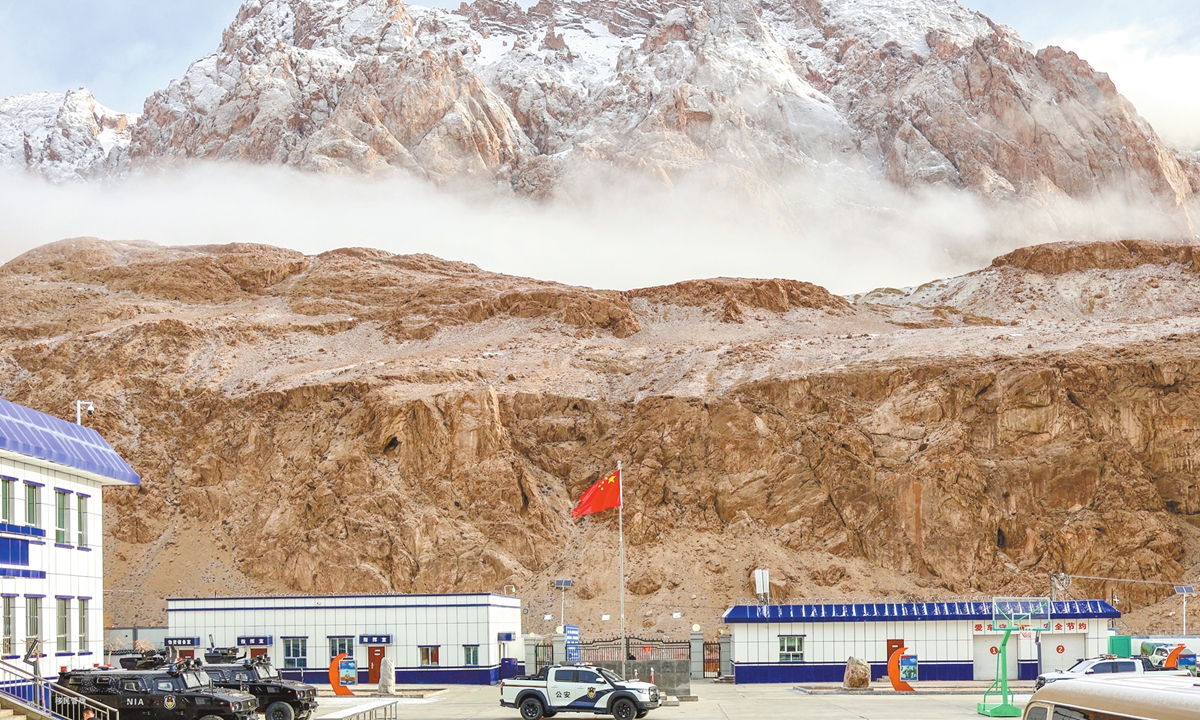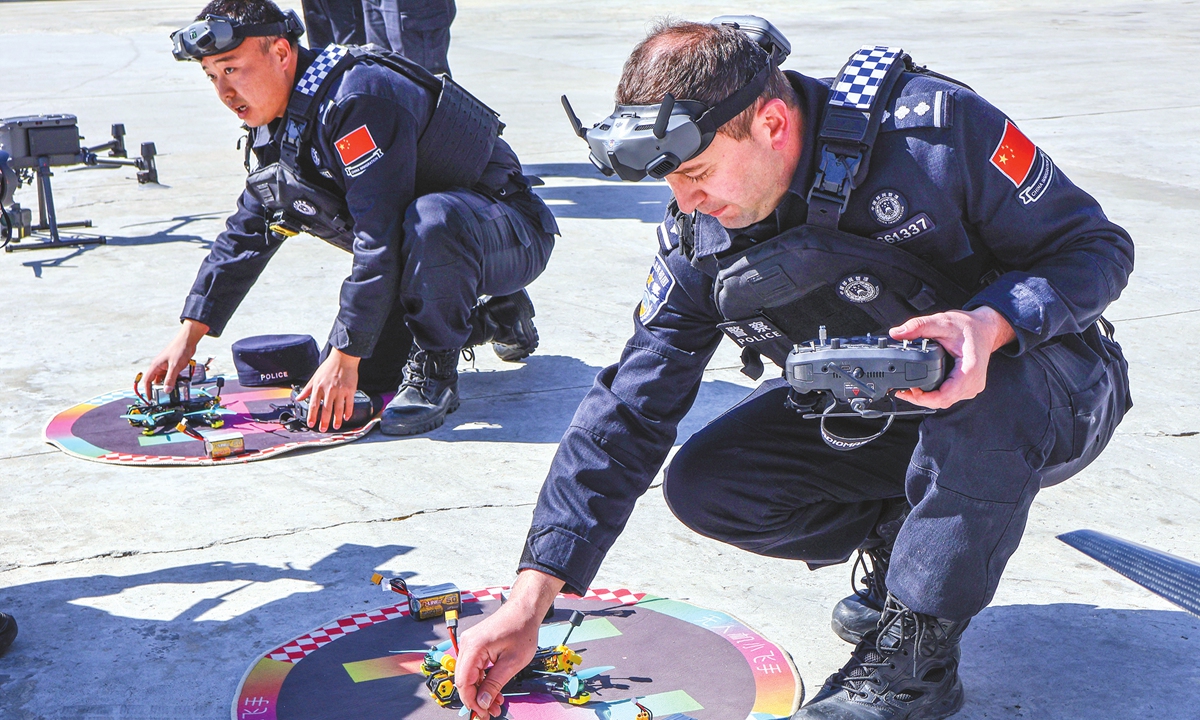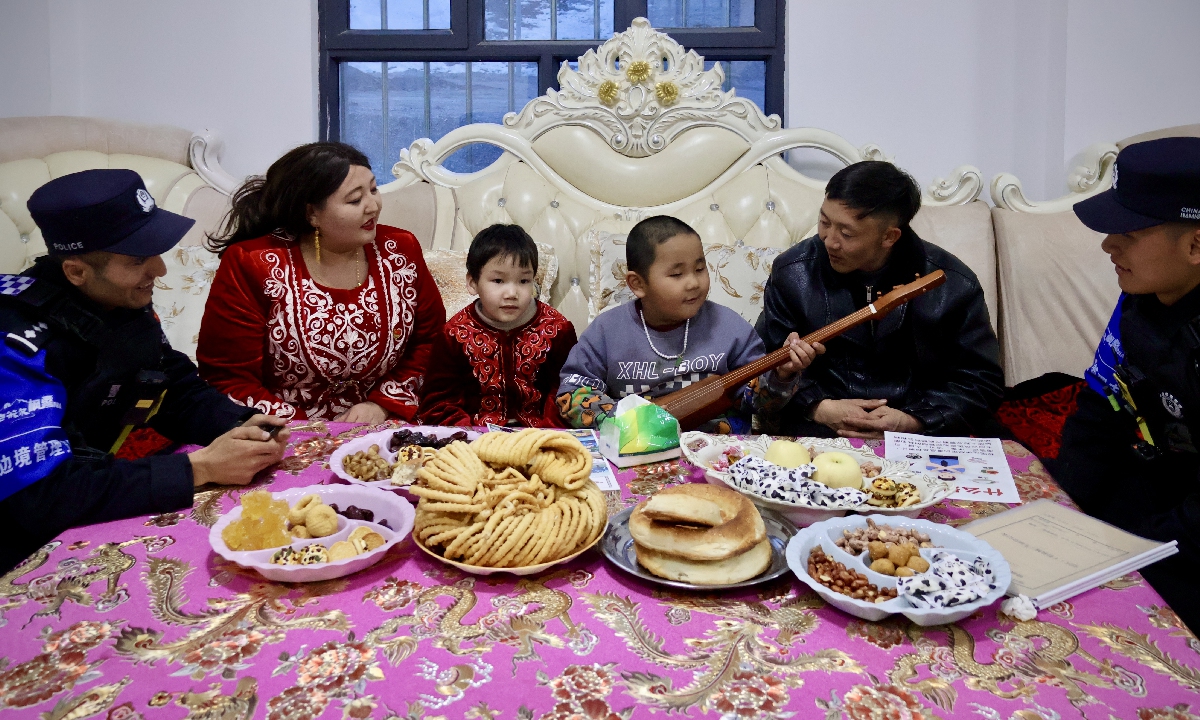
A view of the Paiyike Border Police Station in Taxkorgan Tajik Autonomous County, Northwest China's Xinjiang Uygur Autonomous Region Photo: Lin Xiaoyi/GT
Editor's Note:In the spring breeze of the Pamir Plateau, Northwest China's Xinjiang Uygur Autonomous Region, a lingering chill still hangs in the air. However, at the entrance of the Paiyike Border Police Station in Taxkorgan Tajik Autonomous County, a heartwarming encounter unfolds.
Beijing traveler Chen Dawei had journeyed to the Wakhan Corridor carrying memories of her late father and their shared devotion to Visitors on the Icy Mountain - a 1963 classic about frontier soldiers and the local ethnic groups working together to defend China's border regions.
Standing before the police station overlooking snow-capped peaks, she couldn't help but recite a line from the film: "Fire three flares into the sky to illuminate the mountains and rivers of our homeland."
"I've lost count of the number of times I've watched this film - first as a child with Dad, then as an adult when I re-watched it with him," Chen told the Global Times with her voice trembling. "After his passing in November 2023, coming here felt like fulfilling his unspoken wish."
The encounter turned surreal when station director Peng Mingyou revealed that Xiaogongni Longjike, the grandson of the real-life person who was the inspiration behind the film's heroic protagonist Amir, happened to be on duty. As the deputy chief approached, Chen's disbelief melted into tears. "May I take a photo with you?" she asked, gripping his hand, while a Global Times reporter's camera captured the moment.
The Paiyike Border Police Station, located at the crossroads of three countries, has been safeguarding this strategic passage connecting China to Afghanistan, Pakistan, and Tajikistan. Since its establishment in 1950, Paiyike Border Police Station embodies the slogan affixed to the wall: "A mission in a lifetime: Guarding the motherland's frontiers." Across its 197-kilometers-long patrol routes, generations have upheld this vow.
Recently, Global Times reporter Lin Xiaoyi visited the Paiyike Border Police Station to hear the stories of the officers stationed there. In this place, where icy gusts carry echoes of celluloid patriotism, legacy isn't merely preserved in film reels but in the living pulse of the guardians of the border passing the torch forward through generations.
This story is also part of the Global Times' "Witness to History" series, which features first-hand accounts from individuals who were at the forefront of historic moments. From scholars, politicians, and diplomats, to ordinary citizens, their authentic reflections on the impact of historical moments help reveal a sound future for humanity through the solid forward steps taken in the past and the present.
Family's oath carved in stone and heartLike Chen, Xiaogongni first watched Visitors on the Icy Mountain with his father - a moment that reshaped his life. He vividly remembers that special summer when his father, who was rarely home due to his duties, sat him down for the film, then revealed: "The protagonist was based on your grandfather Kadeer Abudukelimu's story," Xiaogongni shared with the Global Times.
After watching the movie, the seven- or eight-year-old Xiaogongni came to realize that his grandfather was a hero who endured hardships that are unimaginable to ordinary people.
"Without the motherland's border markers, there would be no pastures for our livestock"- this family motto, repeated through generations, traces back to the 1940s when bandits roamed Taxkorgan's Silk Road passes.
Xiao's great-grandfather, Abudukelimu, then a herder, was the first generation of border protectors in their family. Taxkorgan Tajik Autonomous County, once a key point on the ancient Silk Road, was frequently plagued by bandit attacks before the founding of the People's Republic of China in 1949, forcing the Abudukelimu family to hide in the deep mountains. The family found refuge after the Chinese People's Liberation Army (PLA) securing the Pamirs. In gratitude, he helped the troops build outposts by stacking stones and became a "living map" thanks to his familiarity with the terrain, thus beginning the family's enduring connection with border defense.
In 1951, Xiaogongni's grandfather Kadeer enlisted and was stationed in the Wakhan Corridor. Subsequently, Kadeer's son and grandson also dedicated themselves to border defense. Now in his thirties, Xiaogongni is the fourth generation of border protectors in his family.
All police officer at Paiyike Border Police Station know that Xiaogongni's family has a "family motto stone" in the depths of the Wakhan Corridor. The stone inscribed in Tajik, reads: "For China's prosperity, I've guarded borders over four decades. My descendants shall continue this sacred duty - loyal to the Communist Party of China, devoted to the motherland." Officers revealed to the Global Times that despite enduring the elements, the engraved emblem of the PLA and the text remain clear on the stone.
"Grandfather said vows etched in stone won't blow away with the wind," Xiaogongni explained. " This isn't just our family's duty, it's the Tajik people's creed written in our bones."
What Xiaogongni treasures most is the recognition of his work by his father Kadeer, who was honored as one of the "most beautiful veterans" in 2021. Even after retirement, Kadeer often visits the police station, not only to see his son but also to share his experiences in border defense with the younger officers.
When discussing the current state of the Pamir Plateau, Xiaogongni smiled as he shared with Global Times,"The conditions here have changed dramatically compared to the past. The road now extends all the way to the foot of the border mountains, and you can simply get out of the car and hike up to the border marker. For areas that were once difficult to reach on foot, we can now conduct patrols using drones."

Police officers from the Paiyike Border Police Station conduct a law enforcement training session, on March 25, 2025. Photo: Lin Xiaoyi/GT
"The conditions have changed dramatically from what was depicted in the film," he said, "but some things will never change - wherever the border marker is, that's where the heart of the border guard lies."
'No regrets for the youth'

Police officers from the Paiyike Border Police Station conduct community visits to engage with local residents, on March 26, 2025. Photo: Lin Xiaoyi/GT
"Not a single stone along our border can be taken by outsiders." This family motto, passed down through the generations of Xiaogongni's family, is also deeply ingrained in the hearts of the police officers at Paiyike Border Police Station.
But on the station's courtyard wall, another stone tradition thrives - each patrol officer selects a rock during missions and carves a personal message into it.
Unlike his colleagues' inscriptions of "Guard the Land with Duty" or "No Regrets for the Youth," Yuan Xiao, the station's newest recruit, simply etched his name. Yet, every time he passes the stone wall at the station, he glances at a stone that bears the words "Don't be afraid." These words were etched by Liu Lei, his mentor at the outpost.
At 27, Yuan is Paiyike Border Police Station's only officer with a master's degree. After graduating from Gansu University of Political Science and Law, he aced the national civil service exam but chose this 3,780-meter frontier over urban postings. "To follow in my grandfather's footsteps," he replied succinctly when asked by a Global Times reporter why he made this choice.
Yuan's grandfather served in the 1970s to build the Karakoram Highway, a roadway that connects Xinjiang's Kashgar Prefecture with Pakistan's capital Islamabad, volunteering for the most perilous high-altitude sections.
"I was raised by my grandparents, and often heard my grandfather recount stories of building roads in the highlands. I always wanted to see the places where he'd worked when I grew up," Yuan said, sharing his initial motivation with the Global Times.
However, the gap between dreams and reality can be daunting. On his first day in August 2023, the high plateau greeted Yuan with a harsh reality: Biting winds made it hard for him to stand, and severe altitude sickness left him with a splitting headache. Gazing at the desolate mountains, this newly arrived master's graduate found himself in a moment of confusion: "My family supported my decision to serve at the border, and I was confident I could handle it. But during my first patrol at 5,100 meters, seeing my colleagues adapt so easily, I couldn't help but doubt myself. With just ideals, what could I really do?"
Salvation came when Liu mentioned to Yuan the stone he had carved with the words "Don't be afraid." "My mentor said every rookie feels this way," Yuan explained. "Then he reminded me that 50 years ago, grandpa moved stones to build roads here. Now we carve them with vows. That legacy steeled me," Yuan said.
"When I was young, my grandfather told me about his time stationed at over 4,000 meters, where transportation was difficult, and there were no fresh vegetables or fruits, so he lived on canned food. Due to prolonged exposure to water, he developed rheumatoid arthritis, and now his hands and feet are deformed; he can hardly hold chopsticks or walk. Yet, he's never complained. He's always spoken to me about his glory and faith," he said.
Now, every time Yuan returns home while on leave, his grandfather still shares these stories. "But I feel them more deeply," he said. "Back then, he couldn't read, but he had a thirst for knowledge. After working all day, he would lie in bed at night, holding a pencil shorter than my pinky, painstakingly tracing letters. I have knowledge and skills, so I should make the most of my expertise on the plateau."
Today, Yuan leverages his professional background to conduct research on border law enforcement and write academic papers during his patrols. Though Liu had been transferred to other post, every time Yuan passes the stone wall during night patrols, he would search for the one stone inscribed "Don't be afraid" using his flashlight.
"The moment the beam hits it, I feel a deep sense of reassurance."






